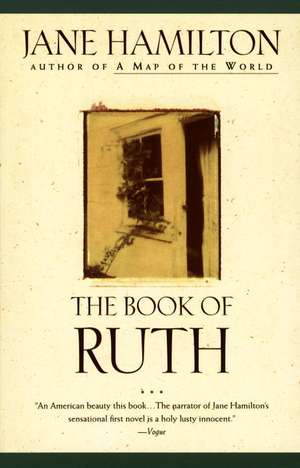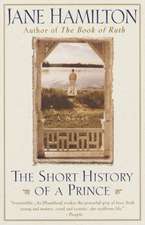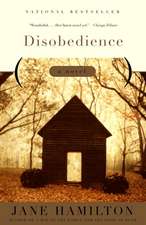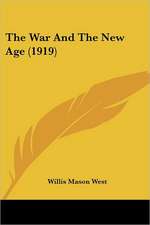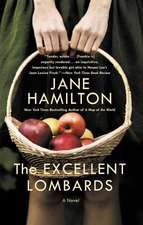The Book of Ruth
Autor Jane Hamiltonen Limba Engleză Paperback – 30 noi 1989
Vezi toate premiile Carte premiată
Preț: 112.52 lei
Nou
Puncte Express: 169
Preț estimativ în valută:
21.53€ • 22.54$ • 17.82£
21.53€ • 22.54$ • 17.82£
Carte disponibilă
Livrare economică 15-29 martie
Preluare comenzi: 021 569.72.76
Specificații
ISBN-13: 9780385265706
ISBN-10: 0385265700
Pagini: 336
Dimensiuni: 134 x 206 x 18 mm
Greutate: 0.25 kg
Ediția:Anchor Books.
Editura: Anchor Books
Locul publicării:New York, NY
ISBN-10: 0385265700
Pagini: 336
Dimensiuni: 134 x 206 x 18 mm
Greutate: 0.25 kg
Ediția:Anchor Books.
Editura: Anchor Books
Locul publicării:New York, NY
Extras
One
What it begins with, I know finally, is the kernel of meanness in people's hearts. I don't know exactly how or why it gets inside us; that's one of the mysteries I haven't solved yet. I always tried to close my eyes and believe that angels, invisible in their gossamer dresses, were keeping their loving vigil. I learned, slowly, that if you don't look at the world with perfect vision, you're bound to get yourself cooked. Even though I may still be looking through the dark glass, even though I haven't finished learning the lessons, I'm the only one who tells the story from beginning to end. It can't be up to Ruby, because he has been spirited away and born again. Neither love nor prayer can bring him back. May can talk herself blue in the face and no one will hear. By rights this belongs to Justy, because he inherits the earth for a short time, but he doesn't quite count yet. He'll remember the taste of pecan balls, exactly how the powdery mash got stuck on the roof of his mouth, the color black maybe, and the color and shape of Ruby's teeth. They were rotten with sweets.
I tell myself that it should be simple to see through to the past now that I'm set loose, now that I can invent my own words, but nothing much has come my way without a price. I'm not counting on a free ride. I know the only way to begin to understand is to steal underneath May's skin and look at the world from behind her small eyes. I shudder when I think about the inside of Ruby's head, but I know I have to journey there too, if I'm going to make sense of what's happened.
Sometimes Aunt Sid shocks me into seeing myself in a new light; she'll speak to me, looking straight into my eyes, and it's as if she's talking to an adult; and then I realize she is, that I am, in fact, grown up. The bones in these legs don't get any longer.
She tells me that there has been a grave error, which is actually how I've felt for a considerable length of time, as if I'm a series of sums that doesn't come out right. She says she doesn't understand how my clear intelligence went unrecognized, but I haven't explained to her yet the confines of my mother tongue. We were the products of our limited vocabulary: we had no words for savory odors or the colors of the winter sky or the unexpected compulsion to sing. The language I had to speak to be understood is not the language of poetry or clear thinking. I only let on once to May that I had acquired other words for private use.
In the Bible it starts with the spirit of God moving upon the face of the water, but I don't buy those ideas. You couldn't pay me to take my story back that far. Everyone's probably heard of Honey Creek, where I lived with Ruby and May. There isn't anything fancy about the location, except the iron gate around the church and the pigeons with their purple breasts.
Mr. Abendroth, the oldest person in town, spends his time walking through farmers' fields picking up corn and stealing apples, and he shares his loot with the pigeons. Honey Creek is way up in the very north of Illinois; if you lean over the Abendroths' back fence your torso is in Wisconsin.
You will miss the town if you drive through listening to your favorite song on the radio or telling a story about your neighbor. The two blocks of white clapboard houses with black trim will look like nothing more than a cloudy morning. Only Mrs. Crawford's house is blue, like the color eyeshadow my friend Daisy wears, and she has a red barn in the back. She had her place painted blue after her husband, Bub, died and everyone figured she'd gone crazy with grief. Then for Christmas she put lights all over the trees in her yard, colored lights which flashed on and off. Then everyone watched to see if she would come out one day wearing hotpants and white boots, setting off to marry someone forty years younger.
Every Memorial Day neighbors get together and put on a parade, a parade without a marching band or a fire truck. There are three horses, five old men dressed in uniforms as if they were all set to free the poor slaves, and a hay wagon with the Kraut Queen, if we're lucky. Last year the queen had ringworm on her face and didn't show. Since there isn't an audience to speak of, because everyone in town is in the parade, it snakes back along the same road after a while so the front can view the rear marching by. One year I wanted to be a nurse with a real Red Cross outfit to wear in the parade, but May said stop wishing for the impossible. She cut a paper plate in half and pinned it in my hair, drew a cross on her white apron, and set me walking.
You're supposed to slow down to 35 when you're going through Honey Creek, but most people speed by. There simply are no outskirts to prepare the driver. At the intersection-that's County Road J-you'll see the post office and the grocery store, which doesn't have anything useful except beer and milk, toothpaste and potato chips. Across the road from the Mart is our church, our white church. One of the church committees put up a steeple a few years ago to accommodate the new bell, which plays songs three times a day. It cracks me up going by there when it chimes "Rock of Ages," as if the church has a big old mouth and it's singing to itself. No one ever stops to listen except the Labrador retriever. He's tied up outside of the post office because he belongs to the postmistress, Laverna. He howls to all the songs like he's overflowing with devotion. He sits on his haunches and lets out a long sad moan.
In the block beyond the church there are four more white houses. All of them have heavy plastic over the windows, meant for winter, which blow and rattle in the summer storms. The pickup trucks, parked outside in every yard, come in handy for deer hunting and cutting wood, plus driving places. If you look in the garages you'll see that they're filled with rusty farm machines, milk cans, large rusted wagon wheels with broken spokes, from the ancestors. People in Honey Creek like to keep junk in the family. You never know if a huge chest of bent nails might not come in handy some time; you can't be too careful. I think folks hold on to metal scraps and furniture because the world is an enormous place, far and wide, but they have never experienced much of it, and they're afraid. They want an anchor so there's no danger of drifting away into outer space, or down under the ground, strange places they aren't too familiar with.
The river comes next. Our town is named after it. It isn't deep or long, but it has water and bloodsuckers and fish. If you cross over the bridge you come to the edge of Honey Creek proper. You see the factory. Everyone in town is proud to have Industry, that's what they call it. It's a cinder block building and it doesn't have windows. Most of the letters fell off the sign that says what it is.
Even with Industry half the town doesn't work in Honey Creek. The other half is practically dead. People go to Stillwater to teach school, sell clothes, work in the factory that makes paper napkins. Honey Creek used to have a mill by the river, but it doesn't function at the present time. It used to grind victuals for humans to eat. I wonder if I'd been born just five miles the other side of town, would I have met Daisy? Would I have known Ruby? Would my story have happened to me or a complete stranger? I'd like to know exactly how much I'm to blame. Was it my character that triggered the events, or chance, that I woke up and found myself in Honey Creek with a big old dog howling to "Rock of Ages"? The ancient saying goes, "None are so blind as they who won't see," and I'm banking on there being truth in it.
Otis Buddle's fields come right up to the parking lot of the factory. There isn't a space between; there isn't a minute to switch gears, get used to the idea. After the factory it's all farms, muddy fields and the smell of someone hauling manure, and the sight of a rusted-out combine sitting in the lane, as dumb and still as a cow. Of course the cemetery is along the highway too. I love walking there in October because the maple trees line the road and they turn crimson and orange and gold, a paper-thin gold., My Aunt Sid says that the trees must be doing a dress rehearsal for their own death, a phrase that has always made me wonder if we rehearse our death, and if we know when we're rehearsing it. There are a lot of dead people in the cemetery, but what you see are the same ten last names, over and over, on the gravestones. I used to be certain that everyone in the whole world was related.
About a half mile out of town is where we live, on a farm. We live in a wooden house, but I wouldn't exactly call it white. It hasn't been painted since May got married the second time, which would take me a long time to calculate, because I'm not, as anyone within twenty miles could tell you, a wizard in math. There are pink granite stone steps up to the porch, similar to palace steps. We go around back to the kitchen door, where the trash and tin cans could trip and kill you if you weren't paying strict attention. May plants purple and red petunias in the planters each year. That's when the washed-out gray house looks drab, compared to the flowers.
When I was small my favorite time of day came at the sight of Wendell Kate driving the cows past our farm into Honey Creek to his barn. It's a gift he gave me. I have the memory of twenty cows stumbling down the road so not one car can get by, and there's Wendell on his big old blue bicycle with the high handlebars. He's a redheaded bachelor. His pants always look like they might slip down from his waist since he doesn't have a rear end to speak of. His crotch is about at his knees. He spent his time in church glancing down the pew and winking at the ladies. I loved the sight of Wendell on his bike, his red hair so flaming his head looked like a great torch, and the twenty cows, not wanting to walk. You'd hear the squeeze horn he had on his handlebars all the way into Honey Creek. He got killed by a bull a few years ago. He didn't like to use that artificial stuff for breeding. He bled to death.
Sometimes I feel like I'm a hundred years old and I can see clear around the world, and then other times I think how I'm nothing; I don't have one thing on my mind except pictures of bachelors riding their bicycles. I haven't even been out of Illinois. I only spit into Wisconsin. In high school, when I was in all the dumb classes, we learned about the evil man, Hitler, over in Germany, and even though Hitler seems as distant to me as the Romans and their crumbling walls, I feel like I know him, just a little. I have to feel kind of sorry for him, for what he had to do. There was something in him that he couldn't help, that made him more terrible than anyone before or after him. I said those words out loud in my class, to Miss Daken, my teacher. She had a nose like a pelican's mouth, this big old hooked nose that looked like it could catch fish. I said that maybe history books didn't tell about Hitler's good points, and she stepped all over me with her steel-toed eyes. She was so tired of teaching dumb students. I wanted to say that it was the same with the Bible; that the serpent was doomed before he hatched, that something so low and sneaky and slippery wouldn't, by its very nature, be taken for good. It seems as if nobody could really be all bad, although everyone has the meanness in them. Sometimes people choose one person in a crowd to pick at. It makes them feel better to say how there's one entirely rotten person they can blame everything on.
When I grew up I heard about the wars we were having with other people, on television. We watched some of the baffles. I knew we were safe from machine gun fire in Honey Creek, where there hadn't ever been wars, if you don't count the Indians. There was only the one Mexican family who lived in the trailer home, and even though they had ten children they were too disorganized to cause trouble outside of their own family. Without putting words to it I recognized the beauty of war; I realized that it was entirely in keeping with ordinary human nature.
It wasn't until I was ten that I realized our family must be the ones with the wrung-out hearts, and that other people's faces shone with a sadness for us. I was ten when my father climbed into the Ford one morning, in the dark. I heard his black boots crunch on the gravel. He was too scared to start the engine so he rolled down the driveway with his foot on the clutch. Goodbye to Illinois, he probably said to himself, because he had lived up here near Honey Creek all his life. I threw off my blankets and ran downstairs and down the road in my nightgown, shouting at him to come back. We learned later that he drove to Texas, to his brother's grapefruit ranch. He lived in a tin shed next to his brother's house and spent his days picking grapefruits the size of my own head. I thought about him at night, reading his paperback books by the light of a smoking kerosene lamp; I couldn't stand the thought of him being happier there, but I had enough sense to know it was true.
Soon after he left we sat in church on Sunday and I could see how sorry people felt for me. I could hear their whisperings about the latest tragedy. I could tell by their faces and their eyes that we were new and strange. They came past us in church, filing out, and I knew suddenly they were the kind of people who would pet me, like I was an animal that didn't have a single chance to survive. The young Mr. Snodgrass bent down to me while May was in the ladies' room and he told me that I was going to be a big strong pretty girl one of these days, and I appreciated his words. But I could tell from the scowl on his wife's face that he was lying. I had heard Aunt Sid telling May she looked pinched once, and I wanted to ask Mr. Snodgrass, right then and there, if I was pinched too. When I got home I took out the mirror to examine my new and strange looks. My eyes are squinched together; they're small and gray and they don't open all the way wide. My mouth isn't too much better off. It's tight like a closed drawstring laundry bag. There's nothing special about my nose: it's small and sits on my face like someone set it down and forgot to come back for it. My hair, my best feature, is nothing more than tight brown curls stuck to my head like I'd taken glue to them, but at least there's room for improvement. When Daisy does my hair over it looks shiny and fluffy, like a souffl? cooked up to perfection. May is very much the same, except she's older and uglier and heavier than I am, and she has a wart by her nose. She has wrinkles too, like she went and slept face down on an oven rack. Sometimes I see her standing by the door, in plain view. She's so clear and radiant she hurts my eyes.
What it begins with, I know finally, is the kernel of meanness in people's hearts. I don't know exactly how or why it gets inside us; that's one of the mysteries I haven't solved yet. I always tried to close my eyes and believe that angels, invisible in their gossamer dresses, were keeping their loving vigil. I learned, slowly, that if you don't look at the world with perfect vision, you're bound to get yourself cooked. Even though I may still be looking through the dark glass, even though I haven't finished learning the lessons, I'm the only one who tells the story from beginning to end. It can't be up to Ruby, because he has been spirited away and born again. Neither love nor prayer can bring him back. May can talk herself blue in the face and no one will hear. By rights this belongs to Justy, because he inherits the earth for a short time, but he doesn't quite count yet. He'll remember the taste of pecan balls, exactly how the powdery mash got stuck on the roof of his mouth, the color black maybe, and the color and shape of Ruby's teeth. They were rotten with sweets.
I tell myself that it should be simple to see through to the past now that I'm set loose, now that I can invent my own words, but nothing much has come my way without a price. I'm not counting on a free ride. I know the only way to begin to understand is to steal underneath May's skin and look at the world from behind her small eyes. I shudder when I think about the inside of Ruby's head, but I know I have to journey there too, if I'm going to make sense of what's happened.
Sometimes Aunt Sid shocks me into seeing myself in a new light; she'll speak to me, looking straight into my eyes, and it's as if she's talking to an adult; and then I realize she is, that I am, in fact, grown up. The bones in these legs don't get any longer.
She tells me that there has been a grave error, which is actually how I've felt for a considerable length of time, as if I'm a series of sums that doesn't come out right. She says she doesn't understand how my clear intelligence went unrecognized, but I haven't explained to her yet the confines of my mother tongue. We were the products of our limited vocabulary: we had no words for savory odors or the colors of the winter sky or the unexpected compulsion to sing. The language I had to speak to be understood is not the language of poetry or clear thinking. I only let on once to May that I had acquired other words for private use.
In the Bible it starts with the spirit of God moving upon the face of the water, but I don't buy those ideas. You couldn't pay me to take my story back that far. Everyone's probably heard of Honey Creek, where I lived with Ruby and May. There isn't anything fancy about the location, except the iron gate around the church and the pigeons with their purple breasts.
Mr. Abendroth, the oldest person in town, spends his time walking through farmers' fields picking up corn and stealing apples, and he shares his loot with the pigeons. Honey Creek is way up in the very north of Illinois; if you lean over the Abendroths' back fence your torso is in Wisconsin.
You will miss the town if you drive through listening to your favorite song on the radio or telling a story about your neighbor. The two blocks of white clapboard houses with black trim will look like nothing more than a cloudy morning. Only Mrs. Crawford's house is blue, like the color eyeshadow my friend Daisy wears, and she has a red barn in the back. She had her place painted blue after her husband, Bub, died and everyone figured she'd gone crazy with grief. Then for Christmas she put lights all over the trees in her yard, colored lights which flashed on and off. Then everyone watched to see if she would come out one day wearing hotpants and white boots, setting off to marry someone forty years younger.
Every Memorial Day neighbors get together and put on a parade, a parade without a marching band or a fire truck. There are three horses, five old men dressed in uniforms as if they were all set to free the poor slaves, and a hay wagon with the Kraut Queen, if we're lucky. Last year the queen had ringworm on her face and didn't show. Since there isn't an audience to speak of, because everyone in town is in the parade, it snakes back along the same road after a while so the front can view the rear marching by. One year I wanted to be a nurse with a real Red Cross outfit to wear in the parade, but May said stop wishing for the impossible. She cut a paper plate in half and pinned it in my hair, drew a cross on her white apron, and set me walking.
You're supposed to slow down to 35 when you're going through Honey Creek, but most people speed by. There simply are no outskirts to prepare the driver. At the intersection-that's County Road J-you'll see the post office and the grocery store, which doesn't have anything useful except beer and milk, toothpaste and potato chips. Across the road from the Mart is our church, our white church. One of the church committees put up a steeple a few years ago to accommodate the new bell, which plays songs three times a day. It cracks me up going by there when it chimes "Rock of Ages," as if the church has a big old mouth and it's singing to itself. No one ever stops to listen except the Labrador retriever. He's tied up outside of the post office because he belongs to the postmistress, Laverna. He howls to all the songs like he's overflowing with devotion. He sits on his haunches and lets out a long sad moan.
In the block beyond the church there are four more white houses. All of them have heavy plastic over the windows, meant for winter, which blow and rattle in the summer storms. The pickup trucks, parked outside in every yard, come in handy for deer hunting and cutting wood, plus driving places. If you look in the garages you'll see that they're filled with rusty farm machines, milk cans, large rusted wagon wheels with broken spokes, from the ancestors. People in Honey Creek like to keep junk in the family. You never know if a huge chest of bent nails might not come in handy some time; you can't be too careful. I think folks hold on to metal scraps and furniture because the world is an enormous place, far and wide, but they have never experienced much of it, and they're afraid. They want an anchor so there's no danger of drifting away into outer space, or down under the ground, strange places they aren't too familiar with.
The river comes next. Our town is named after it. It isn't deep or long, but it has water and bloodsuckers and fish. If you cross over the bridge you come to the edge of Honey Creek proper. You see the factory. Everyone in town is proud to have Industry, that's what they call it. It's a cinder block building and it doesn't have windows. Most of the letters fell off the sign that says what it is.
Even with Industry half the town doesn't work in Honey Creek. The other half is practically dead. People go to Stillwater to teach school, sell clothes, work in the factory that makes paper napkins. Honey Creek used to have a mill by the river, but it doesn't function at the present time. It used to grind victuals for humans to eat. I wonder if I'd been born just five miles the other side of town, would I have met Daisy? Would I have known Ruby? Would my story have happened to me or a complete stranger? I'd like to know exactly how much I'm to blame. Was it my character that triggered the events, or chance, that I woke up and found myself in Honey Creek with a big old dog howling to "Rock of Ages"? The ancient saying goes, "None are so blind as they who won't see," and I'm banking on there being truth in it.
Otis Buddle's fields come right up to the parking lot of the factory. There isn't a space between; there isn't a minute to switch gears, get used to the idea. After the factory it's all farms, muddy fields and the smell of someone hauling manure, and the sight of a rusted-out combine sitting in the lane, as dumb and still as a cow. Of course the cemetery is along the highway too. I love walking there in October because the maple trees line the road and they turn crimson and orange and gold, a paper-thin gold., My Aunt Sid says that the trees must be doing a dress rehearsal for their own death, a phrase that has always made me wonder if we rehearse our death, and if we know when we're rehearsing it. There are a lot of dead people in the cemetery, but what you see are the same ten last names, over and over, on the gravestones. I used to be certain that everyone in the whole world was related.
About a half mile out of town is where we live, on a farm. We live in a wooden house, but I wouldn't exactly call it white. It hasn't been painted since May got married the second time, which would take me a long time to calculate, because I'm not, as anyone within twenty miles could tell you, a wizard in math. There are pink granite stone steps up to the porch, similar to palace steps. We go around back to the kitchen door, where the trash and tin cans could trip and kill you if you weren't paying strict attention. May plants purple and red petunias in the planters each year. That's when the washed-out gray house looks drab, compared to the flowers.
When I was small my favorite time of day came at the sight of Wendell Kate driving the cows past our farm into Honey Creek to his barn. It's a gift he gave me. I have the memory of twenty cows stumbling down the road so not one car can get by, and there's Wendell on his big old blue bicycle with the high handlebars. He's a redheaded bachelor. His pants always look like they might slip down from his waist since he doesn't have a rear end to speak of. His crotch is about at his knees. He spent his time in church glancing down the pew and winking at the ladies. I loved the sight of Wendell on his bike, his red hair so flaming his head looked like a great torch, and the twenty cows, not wanting to walk. You'd hear the squeeze horn he had on his handlebars all the way into Honey Creek. He got killed by a bull a few years ago. He didn't like to use that artificial stuff for breeding. He bled to death.
Sometimes I feel like I'm a hundred years old and I can see clear around the world, and then other times I think how I'm nothing; I don't have one thing on my mind except pictures of bachelors riding their bicycles. I haven't even been out of Illinois. I only spit into Wisconsin. In high school, when I was in all the dumb classes, we learned about the evil man, Hitler, over in Germany, and even though Hitler seems as distant to me as the Romans and their crumbling walls, I feel like I know him, just a little. I have to feel kind of sorry for him, for what he had to do. There was something in him that he couldn't help, that made him more terrible than anyone before or after him. I said those words out loud in my class, to Miss Daken, my teacher. She had a nose like a pelican's mouth, this big old hooked nose that looked like it could catch fish. I said that maybe history books didn't tell about Hitler's good points, and she stepped all over me with her steel-toed eyes. She was so tired of teaching dumb students. I wanted to say that it was the same with the Bible; that the serpent was doomed before he hatched, that something so low and sneaky and slippery wouldn't, by its very nature, be taken for good. It seems as if nobody could really be all bad, although everyone has the meanness in them. Sometimes people choose one person in a crowd to pick at. It makes them feel better to say how there's one entirely rotten person they can blame everything on.
When I grew up I heard about the wars we were having with other people, on television. We watched some of the baffles. I knew we were safe from machine gun fire in Honey Creek, where there hadn't ever been wars, if you don't count the Indians. There was only the one Mexican family who lived in the trailer home, and even though they had ten children they were too disorganized to cause trouble outside of their own family. Without putting words to it I recognized the beauty of war; I realized that it was entirely in keeping with ordinary human nature.
It wasn't until I was ten that I realized our family must be the ones with the wrung-out hearts, and that other people's faces shone with a sadness for us. I was ten when my father climbed into the Ford one morning, in the dark. I heard his black boots crunch on the gravel. He was too scared to start the engine so he rolled down the driveway with his foot on the clutch. Goodbye to Illinois, he probably said to himself, because he had lived up here near Honey Creek all his life. I threw off my blankets and ran downstairs and down the road in my nightgown, shouting at him to come back. We learned later that he drove to Texas, to his brother's grapefruit ranch. He lived in a tin shed next to his brother's house and spent his days picking grapefruits the size of my own head. I thought about him at night, reading his paperback books by the light of a smoking kerosene lamp; I couldn't stand the thought of him being happier there, but I had enough sense to know it was true.
Soon after he left we sat in church on Sunday and I could see how sorry people felt for me. I could hear their whisperings about the latest tragedy. I could tell by their faces and their eyes that we were new and strange. They came past us in church, filing out, and I knew suddenly they were the kind of people who would pet me, like I was an animal that didn't have a single chance to survive. The young Mr. Snodgrass bent down to me while May was in the ladies' room and he told me that I was going to be a big strong pretty girl one of these days, and I appreciated his words. But I could tell from the scowl on his wife's face that he was lying. I had heard Aunt Sid telling May she looked pinched once, and I wanted to ask Mr. Snodgrass, right then and there, if I was pinched too. When I got home I took out the mirror to examine my new and strange looks. My eyes are squinched together; they're small and gray and they don't open all the way wide. My mouth isn't too much better off. It's tight like a closed drawstring laundry bag. There's nothing special about my nose: it's small and sits on my face like someone set it down and forgot to come back for it. My hair, my best feature, is nothing more than tight brown curls stuck to my head like I'd taken glue to them, but at least there's room for improvement. When Daisy does my hair over it looks shiny and fluffy, like a souffl? cooked up to perfection. May is very much the same, except she's older and uglier and heavier than I am, and she has a wart by her nose. She has wrinkles too, like she went and slept face down on an oven rack. Sometimes I see her standing by the door, in plain view. She's so clear and radiant she hurts my eyes.
Recenzii
“An American beauty this book…. The narrator of Jane Hamilton’s sensational first novel is a holy lusty innocent.” –Vogue
“A sly and wistful, if harrowing, human comedy. Hamilton is a new and original voice in fiction and one well worth listening to.” –Boston Sunday Globe
“Ms. Hamilton gives Ruth a humble dignity and allows her hope–but it’s not a heavenly hope. It’s a common one, caked with mud and held with gritted teeth. And it’s probably the only kind that’s worth reading about.” –The New York Times Book Review
“Hamilton’s story builds to a shocking crescendo. Her small-town characters are a appealingly offbeat and brushed with grace as any found in Alice Hoffman’s or Anne Tyler’s novels.” –Glamour
“Jane Hamilton’s novel is authentically Dickensian…. The real achievement of this first novel is not so much the blackness as the suggestion of resilience. At the end, Ruth begins to put together her shattered body, spirit and life. Her words are awkward, as they have been all along, but suddenly and unexpectedly they shine.” –Los Angeles Times
“A disturbing and beautiful book.” –Hilma Wolitzer
“An extraordinary story of a family’s disintegration…. Will be compared to Jane Smiley’s A Thousand Acres. Astonishingly vivid and moving.” –People
“An enthralling tale of guilt, betrayal, and the terrifying ways of our lives.” –Entertainment Weekly
“Unforgettably, beat by beat, Hamilton maps the best and worst of the human heart and all the mysterious, uncharted country in between.” –Kirkus Reviews
“A sly and wistful, if harrowing, human comedy. Hamilton is a new and original voice in fiction and one well worth listening to.” –Boston Sunday Globe
“Ms. Hamilton gives Ruth a humble dignity and allows her hope–but it’s not a heavenly hope. It’s a common one, caked with mud and held with gritted teeth. And it’s probably the only kind that’s worth reading about.” –The New York Times Book Review
“Hamilton’s story builds to a shocking crescendo. Her small-town characters are a appealingly offbeat and brushed with grace as any found in Alice Hoffman’s or Anne Tyler’s novels.” –Glamour
“Jane Hamilton’s novel is authentically Dickensian…. The real achievement of this first novel is not so much the blackness as the suggestion of resilience. At the end, Ruth begins to put together her shattered body, spirit and life. Her words are awkward, as they have been all along, but suddenly and unexpectedly they shine.” –Los Angeles Times
“A disturbing and beautiful book.” –Hilma Wolitzer
“An extraordinary story of a family’s disintegration…. Will be compared to Jane Smiley’s A Thousand Acres. Astonishingly vivid and moving.” –People
“An enthralling tale of guilt, betrayal, and the terrifying ways of our lives.” –Entertainment Weekly
“Unforgettably, beat by beat, Hamilton maps the best and worst of the human heart and all the mysterious, uncharted country in between.” –Kirkus Reviews
Descriere
A standout in the crowd of first novels, Ruth narrates a story that confronts real-life issues of alienation and violence from which Hamilton creates a stunning testament to the human capacity for mercy, compassion, and love. Winner of the 1989 PEN/Hemingway Foundation Award.
Notă biografică
Premii
- Hemingway Foundation/PEN Award Winner, 1989
